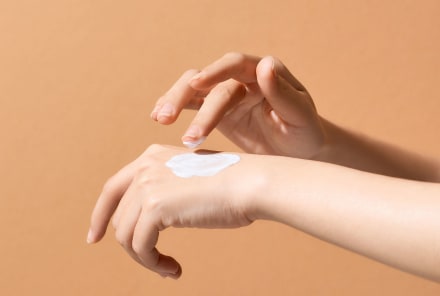Advertisement
Apple Cider Vinegar For Warts: Does It Work? We Investigate + How To Do It Safely


Apple cider vinegar is hailed for a number of reasons: Topically, it's been shown to help your hair shine and exfoliate your skin. It certainly makes you want to invest in the fermented drink for the beauty benefits alone.
Among those advantages, there have been whispers (more like cheers, actually) about one particular DIY trick: apple cider vinegar for warts. Apparently, the solution does more than keep breakouts at bay. But does this ACV remedy live up to the hype? Let's investigate.
Does it work?
Here's the thing: The science on apple cider vinegar for warts is pretty limited. There have been some scattered reports on how the acetic acid in vinegar can alleviate the warts, but there's not nearly enough research to make it a reliable treatment. The evidence, it turns out, is largely anecdotal.
Despite the lack of literature, the amount of success people share from this ACV trick makes it difficult to ignore. People have found it helpful for a couple of reasons: First, vinegar has antibacterial properties1 that can kill some types of bacteria and viruses. (That's what makes ACV a great DIY cleaner, from your kitchen counter to the bathtub.) Since warts are caused by the human papillomavirus, also known as HPV2, people think apple cider vinegar has an antiviral effect that's able to manage the infection.
Many others believe apple cider vinegar works similarly to salicylic acid—like the beloved BHA, the acidity in apple cider vinegar can help slough away dead skin cells while soothing irritation (making it a noteworthy natural toner). Prescription-strength wart medications typically contain salicylic acid, as it can help dissolve the infected area over time3, and people believe ACV follows a similar beat.
Summary
How to use apple cider vinegar for warts
Sure, the hard data may be limited, but using apple cider vinegar on warts is an intriguing experiment, to say the least. If you think it might work for you, it's quite easy to DIY the treatment at home. Here's what functional medicine doctor Tina Discepola, M.D., suggests, as she previously described to mbg:
- Soak a small cotton ball in diluted apple cider vinegar (we suggest two parts ACV, one part water), then fasten it to the wart overnight with a Band-Aid or porous skin tape. Repeat nightly as needed until the lesion is gone.
- After a couple of treatments, you may notice the skin start to swell and the wart turning black and eventually falling off. Continue until the skin is completely clear.
A couple of necessary notes of precaution here: You always want to dilute the ACV in water before applying it to the area—due to its acidic nature, apple cider vinegar alone may cause skin irritation. If you think you might be at all sensitive to the solution, even with the dilution, make sure to do a patch test before applying.
You should also steer clear of any open wounds (the vinegar will sting!), as well as the face and neck—a higher concentration of ACV can be especially irritating to those delicate areas. On that note, make sure to apply the ACV only onto the infected skin itself—be careful not to saturate the surrounding area to avoid unnecessary skin irritation (a few studies have shown apple cider vinegar applied directly to the skin can have some pretty adverse effects, even as far as chemical burns4). As always, consult your derm with any lingering questions or concerns you have before diving into it.
The takeaway
Using apple cider vinegar is a popular at-home trick for removing warts. But while there's anecdotal evidence aplenty, the hard data is pretty lacking. That said, much more research is required before we can say whether ACV makes an effective wart remover.
If you find it works for you—great! Enjoy your clear skin. If you're trying it out, make sure to keep checking on the infection in case the DIY route comes up short. You may have to stick to traditional treatment (including prescription-strength topicals and in-office visits) for the time being.
Editor's Note: This article was originally published on July 10, 2020 and has been updated over time. A previous version of this article indicated that apple cider vinegar (ACV) can help whiten teeth. While this statement was made based on data that was publicly available at the time of publication, the latest scientific research indicates ACV may erode your teeth enamel. Please practice caution when using ACV to whiten your teeth. We recommend consulting with your doctor to determine if ACV is the best way way to whiten your teeth.











